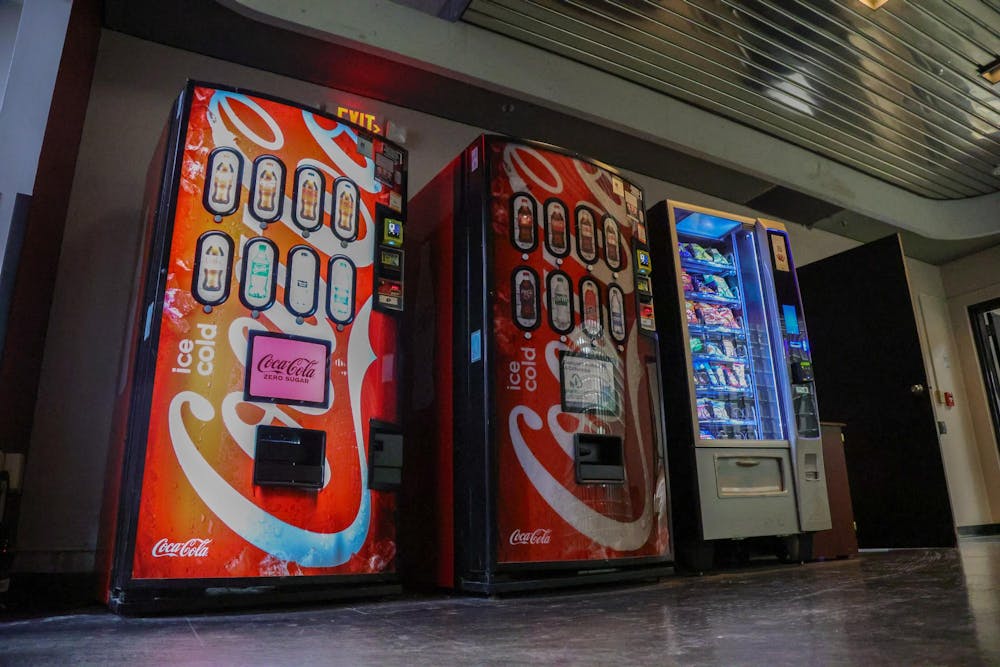While USC offers a reasonable number of vending machines located around campus, students often face issues with actually receiving the products they paid for. The university's vending machines are notorious for leaving students out to dry in tandem with a poor refund system that is almost worse than the already low percentage of actually received beverages.
On top of that, USC heavily promotes the CarolinaCard as an all-purpose, convenient way to pay for books, services and food both on and off campus, including vending machines. The message students hear is that they can rely on swiping their card whenever they need it. But when that system instead charges students without delivering the product and then makes getting a refund a hassle, it feels like the university is breaking its own promise of convenience.
USC originally partnered with the Coca-Cola Company in 2001, entering a 10-year agreement to provide vending products and services on campus. This agreement has lasted, following the Board of Trustees' seven-year vending services contract with Coca-Cola filed in April 2018. The agreement covers soft drinks, sports drinks, juice and snacks.
Agreements like these are often known as pouring rights contracts, where a company, such as Coca-Cola or Pepsi, gets exclusive rights to sell and market beverages on a campus in exchange for sponsorship money or other payments to the university. In practice, that means Coke products dominate athletic events and vending machines, and the university commits to promoting that brand in many parts of student life. When one company benefits from that level of exclusivity and visibility, students have every right to expect the actual service to match the size of the deal.
Yet, despite that long-running contractual agreement between the university and Coca-Cola, there has been a lackluster job of maintaining, providing and improving upon the advertised experience to the students. While most academic buildings feature a drink vending machine, the lack of snack machines in these locations leaves students out to dry during a mid-afternoon refuel.
The university even highlights vending as part of the campus experience by publishing resources that map out vending locations and present them as places to grab a quick snack between commitments. However, that ideal shatters as you walk through classroom buildings and find only drink machines or, even worse, machines that are empty, broken or stocked with items that aren’t a real snack. For students sprinting from one class to another with no time for the dining hall, this gap between the advertised convenience and everyday reality is especially frustrating.
That reliability of machines and their availability throughout the day is a major issue. Widespread technical failures and out-of-order machines have become such an issue on campus that the CarolinaCard office has set up a dedicated form for students to report vending machine problems and request refunds for products they never received. Additionally, students are unable to access most machines after the buildings they are located in lock their doors for the night. Not only can students not always guarantee that they'll get what they pay for, but they also can't rely on getting late-night study fuel either.
USC’s own CarolinaCard toolbox page specifically invites students to use separate drink and snack vending refund forms if they encounter an issue with a campus vending machine. The refund pages instruct students to describe the problem in detail, and they even note that if a wrong or out-of-date product comes out, it must be physically returned to the office before a refund will be processed.
On top of that, refunds are typically credited back to the CarolinaCard account rather than given in cash, which keeps the money locked into the university system. All of this means that every time a machine malfunctions, the student must fill out forms, travel to an office and wait just to fix a transaction that should have been simple.
While the university's contract mandates a 48-hour turnaround on maintenance requests, student feedback suggests that the required timely maintenance hardly occurs. Additionally, students are the ones that must report these issues, which likely leads to longer wait times for maintenance and operational issues.
While this issue defiantly affects the speed of maintenance requests, why should students be responsible for reporting these issues when their tuition money partly goes toward upkeeping the system? Shouldn't it be the university's responsibility to maintain its facilities for students, as stated in its official maintenance policy?
At the same time, other universities and vendors have started using modern smart vending machines with built-in sensors that can detect when a product fails to drop and automatically reverse the charge, or systems that release any temporary hold on a card within about 48 hours if nothing is dispensed. In those cases, students don’t have to hunt down forms or argue about whether they deserve a refund; the technology simply protects them by default. Compared to that, the approach of relying on students to notice problems, report them manually and wait for credits makes its promised 48-hour maintenance standard feel weak and outdated.
The vending machines are the perfect distillation of a university that charges premium tuition but delivers dollar-store service. The contract guarantees Coca-Cola's visibility, but it never promised students would get to drink the product. Every failed vend, every wasted refund form, every sprint between classes that ends with a mocking "OUT OF ORDER" sign is a small act of theft.
We didn't come here to be quality control for a system that profits from its own failure. We came here to learn — and sometimes just to get a soda. If USC can't honor a $3 transaction, why should we trust it with six-figure degree? Fix the machines. Or better yet, fix the mindset that this is acceptable.

